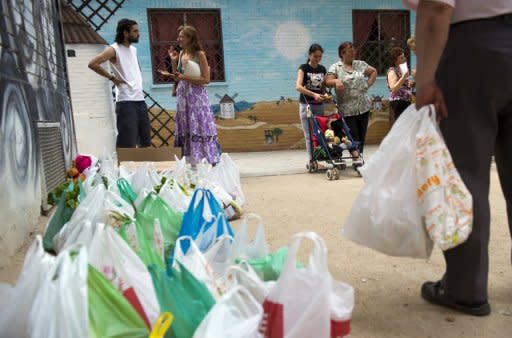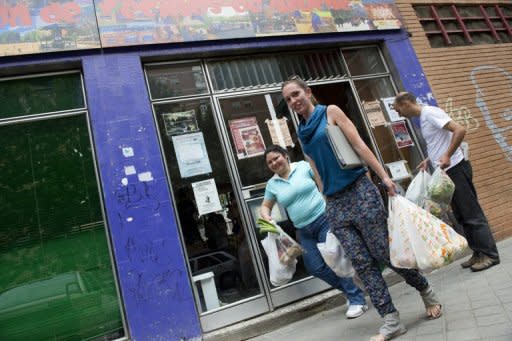Spain's 'indignants" fight crisis with food aid
Spain's "indignant" protesters against economic injustice, who once inspired a global uprising, seem to have vanished from the headlines right at the peak of a financial crisis. But that does not mean they have given up. In fact, far from the public squares they once occupied in their tens of thousands in a blaze of publicity, the "indignants" are building an extraordinary street-level network to help those hardest hit by economic hardship. Jhenny, a 35-year-old Ecuadorian immigrant whose declined to give her family name, said she struggles to provide for her family, with her husband out of work for more than a year. When in need, she can go to a free food bank in southern Madrid's working class district of Usera and stock up on potatoes, carrots, apples and other fresh produce for her family. "I get all my fruit and vegetables here. It is a huge help," she said, resting on a chair surrounded by plastic bags packed with groceries. But the food bank is not run by the Church or a charity. It was set up in January by the "indignants". It is an example of how the movement, which emerged in May 2011 to decry sky-high unemployment and the economic system it blames for the crisis, has shifted its focus to building the just society it advocates. When their protest camps were dismantled, the activists set up neighbourhood associations that now run food banks for the poor, "time banks" where people can exchange favours and a cooperative. "Indignant" activists rally supporters to block home evictions; help homeless families to occupy empty flats; run a legal advice office; and broadcast reports on the movement via an online TV station. "We are trying to create a more sustainable and fairer economy," said activist Diego Gutierrez as he loaded a red van with a bag of potatoes donated to the Usera food bank by a Romanian couple's vegetable shop. While attendance at neighbourhood assemblies of "indignants" has plummeted, those left are more determined. "We had 1,600 people at our first assembly. Now there are around 18 who come but they are more committed," said Gutierrez, a 41-year-old psychologist who works as a school counsellor a few hours per week. So far 82 families have signed up to use the Usera food pantry -- which gets absolutely no government money -- and every Friday 20 to 25 people turn out to collect food. Jhenny, a mother of two who works part-time as a housekeeper, said she is able to save around 60 euros ($75) a month thanks to the food aid. "This is money that I can use to buy clothes and shoes for my two daughters," she said. "Indignant" volunteers collect food donations from small neighbourhood shops, many struggling themselves. Raul Barbero, a 41-year-old father of three who runs a fruit shop, said he always gives the food pantry something every week because "for two years I had nothing to eat." "I went through really hard times. With a little bit donated by everyone, you will have a lot," he said as he prepared a crate of apricots, cherries and other fruit to give away. Once a month the Usera "indignants" run a "swap meet" at a park where people can barter goods, from clothes to toys to books to furniture, and save money at the same time as they get rid of items they no longer need. One of the most ambitious projects is a cooperative that offers services like plumbing and painting provided by the jobless -- Spain's unemployment rate is 24.44 percent, the highest in the industrialised world. Jobs for the "Synergy Cooperative" are shared on a rotating basis among its 230 members at three branches in Madrid. It plans soon to start producing soap and beer. The goal is to set up branches in all neighbourhoods across the country. Arturo de Bonis, 55, a former World Bank project manager in Africa who helped set up the cooperative, said the movement evolved because people realised that "protests alone were not changing things." "These types of initiatives will continue to expand in the coming years because people see that our economic system does not work," he added. Other neighbourhood assemblies of "indignants" have set up "time banks" that use units of time as currency and provide services ranging from hair cutting to bicycle repair. If you give an hour's work, you receive credit for an hour's work by another member of the "time bank". All services are valued equally. An hour of a hairdresser's time is equal to one hour of a massage therapists' time. "The time bank allows people to improve their quality of life without spending money," said Maria Jose, a 59-year-old primary school teacher who helps run the project in Retiro, a leafy middle-class Madrid neighbourhood. "Indignant" activists say the goal of initiatives like "time banks" and food banks is as much about strengthening ties among neighbours as it is providing economic aid. "Your neighbours start to be your friends. It's fantastic," said Isabel Perez, 47, a self-employed solar energy consultant and mother of two who helps run the food bank in Usera.




